Controversy Continues In Iran Over Petrochemical Project In Nature Reserve
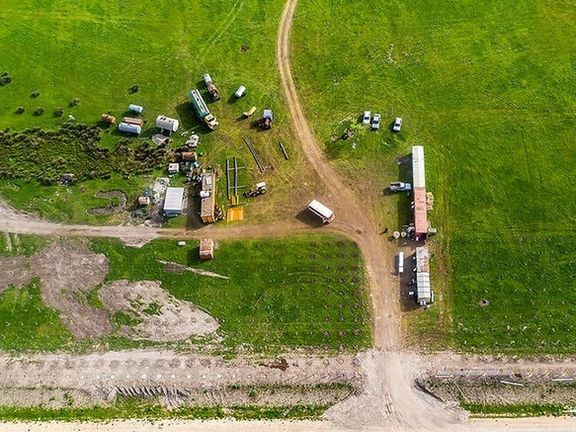
Controversy over an environmentally dangerous petrochemical project continues in Iran as some government officials have defended it despite an earlier ban.

Controversy over an environmentally dangerous petrochemical project continues in Iran as some government officials have defended it despite an earlier ban.
The petrochemical plant in Miankaleh, northern Iran is planned to be built next to a nature reserve, which galvanized opposition by activists and citizens in the past two weeks. President Ebrahim Raisi came out against the project earlier this week and Iran’s Judiciary issued an order to stop construction until further studies.
However, the governor of Mazandaran province and the Friday Prayer Imam of the region strongly defended the project. The governor is appointed by Raisi and the Imam by Supreme Leader Ali Khamenei. Some hardliners went as far as saying opponents of the project are in essence opponents of the Supreme Leader, thus trying to accuse them of a political crime.
The Speaker of parliament Mohammad Bagher Ghalibaf also has backed the project.
In addition, it was alleged in the media that the owner of the petrochemical plant is a super-borrower from government banks, making the whole project politically more controversial. The individual owners of the land and the project remain hidden from public view, as a host of front companies are officially holders of the permit.
Super-borrowers are influential political insiders who borrow huge sums using their influence, often with no intention to pay back.
The government of former president Hassan Rouhani in an apparently hasty move approved the petrochemical project last year and it obtained the oil ministry’s permission in an unusually fast-tracked manner.
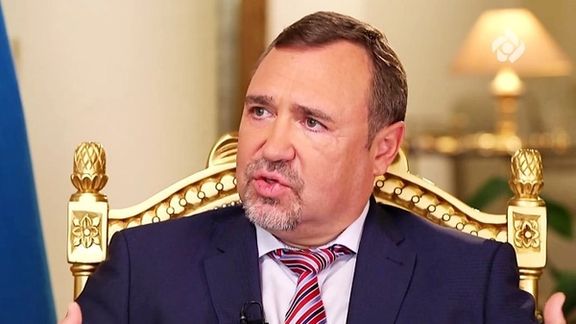
Ukraine’s ambassador to Tehran has attacked the Iranian government over its stance on the Russian invasion and challenged it to send oil to Ukraine.
“My analysis is that Russia has failed, both tactically and operationally, and also strategically,” Serhii Burdyliak told Asia newspaper in an interview published Saturday. The ambassador claimed all European countries were supporting Ukraine because should it fail, no European country would be safe from Russian invasion.
Burdyliak argued that current sanctions by the United States and the European Union counties would be tightened. He claimed Germany had announced it was ready to cut off oil, gas, and coal imports from Russia – whereas in fact Germany, while saying it was ready to consider an oil embargo, is still importing gas.
The ambassador also claimed, “the majority of Iranian people support Ukraine,” while the government was “standing by Russia now.” Burdyliak argued that the prospect of cutting off Russian energy exports to Europe would bring the US and western Europe closer to reviving the 2015 nuclear deal, presumably to gain access to Iranian oil or gas.
Burdyliak warned Iran to think of its longer-term interests. “If for example, we assume that next year there will be problems in relations with Russia, and if the Iranian government continues its position of not supporting Ukraine, and next year Iran wants to get food from Ukraine, Ukraine would ask, ‘Where have you been so far? Where were you a year ago when we needed your humanitarian aid?’”
Oil tankers at Qeshm island
Tehran has defended Ukrainian sovereignty while pointing out that the expansion of Nato to 13 eastern European countries since 1999 was seen as a security threat by Moscow. Along with Armenia, China, India, and Iraq, Iran abstained in the March vote at the United Nations General Assembly condemning Russian military intervention.
Burdyliak suggested Iran should send oil to Ukraine, presumably once the US lifted ‘maximum pressure’ sanctions currently threatening punitive action against anyone taking Iranian crude.
“I was on the [Iranian] island of Qeshm, and there I saw oil tankers waiting for customers,” he said. “I thought, what if you were sending some of these tankers through Poland and Romania to help Ukraine?”…In such a case, you would be proud to have helped a war-torn country”.
There has been a lively discussion in the Iranian media over the war in Ukraine, with most principlist and state media, including state broadcaster IRIB, blaming Nato’s role and accusing the US of abandoning Ukraine after allegedly encouraging them to defy Moscow.
Iran last year imported record amounts of wheat it is vulnerable like some populous Middle Eastern countries to rising commodity prices. Egypt takes over 70 percent of its wheat from Russian and Ukraine.
Middle Eastern countries, including Israel, have also worked to maintain links with Moscow. Oil producers led by Saudi Arabia, which has a good relationship with Russia, have refused US requests to increase crude exports
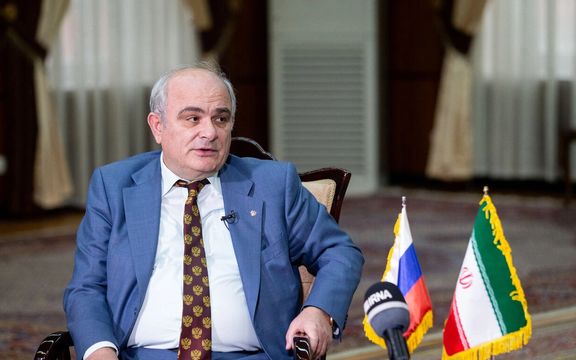
The Russian envoy in Tehran has accused some Iranian media of provoking anti-Russian sentiments among Iranians over Moscow's role in Vienna nuclear talks.
In early March, during talks to restore the 2015 nuclear deal (JCPOA), Russia demanded exemption from the United States regarding Ukraine sanctions in all its dealings with Iran.
In an interview with Khabar Foori news website published Friday, Levan Dzhagaryan(Jagaryan) criticized Iranian media for alleging that Russia’s demand had disrupted the JCPOA talks in Vienna, which supposedly was near a successful conclusion.
Iranian media and the public had indeed expressed outrage at Russia’s demand, seeing it as a hurdle in the way of conclusion of an agreement and blackmail.
After Washington's refusal to budge, and Iranian media's strong criticism, Moscow appeared to back off and seek only guarantees related to the implementation of the 2015 deal rather than all economic relations as initially demanded.
"They are printing one-sided anti-Russian articles every day. It seems that they have turned into the Iran-based branch of the BBC's Persian radio," Dzhagaryan said. He singled out the reformist Etemad newspaper as an media outlet critical of Russia.
"They should ask the members of the Iranian negotiation team. They regularly express their gratitude that Russia and particularly our representative in the Vienna [talks], Mr. [Mikhail] Ulyanov helps a lot … We have always helped, are helping and will help together with our Chinese friends," the Russian envoy said.
In the interview with Khabar Foori, the Russian envoy in Tehran admitted that he was "very worried" about public opinion in Iran turning against Russia. "With the works that we do with your help, and the help of other independent media that aren't under Western influence and don't listen to the BBC, we try to explain [our views to them]," he said.
Dzhagaryan claimed that media in Iran couldn't be prevented from criticizing Russia because of freedom of expression in Iran. "Iran is much more advanced [in freedom of expression] than European countries."
Dzhagaryan also denied that Russia may consider itself Iran's rival in the energy market and therefore not happy with the prospects of US lifting sanctions on Iran which will allow Iranian crude oil to flow into international markets. "[Such allegations] are only a plot of the enemy that opposes [close] relations between Iran and Russia and are looking for excuses to cast a shadow on it."
Many Iranians have a historical bias and distrust towards Russia for historic interferences in Tsarist times in Iran's domestic affairs, wars fought between the two countries, and later, the continuation of the same policies by the Soviets.
Russia's proactive role in the Vienna talks also caused concerns among Iranians. The remarks and photos of the meetings posted by the Russian envoy on Twitter occasionally offered fuel for controversy and many alleged that Ulyanov was running the talks instead of the Iranian negotiators and making announcements on their behalf.
The Russian envoy to Tehran has become quite a controversial figure in Iran in recent months.
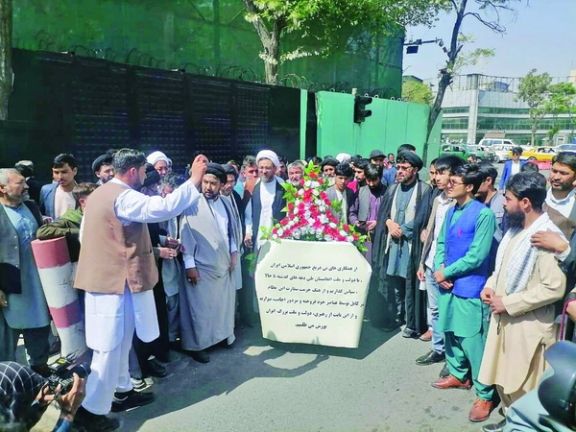
Taliban forces have closed a center with links to Iran that had organized a gathering in front of Tehran’s embassy in Kabul to express support for the Islamic Republic.
Tebyan Center for Socio-Cultural Activities, the organizer of the event, said in a statement on Friday that Taliban agents arrested the head of their office Yarmohammad Rahmati on Thursday.
The center held a pro-Iran rally on Wednesday with participants placing flowers on the doors of the embassy building and reading a statement about “solidarity between the brotherly nation of Iran and Afghanistan”.
The Tebyan Center denied reports that the it was shut down completely and said only its activities are restricted without providing details.
There are reports that Taliban has also arrested several people who were connected to the center in Herat.
Protestors Monday attacked the Iranian consulate in Herat hurling stones, smashing security cameras, and burning tires before they were dispersed by Taliban security. Earlier Monday, people also held a demonstration outside Iran’s embassy in Kabul over alleged mistreatment of Afghan immigrants in Iran.
Following the attacks, Iran’s Foreign Ministry said Tehran will not resume its consular services before receiving assurances from Afghan authorities over protection of its diplomatic missions in Afghanistan.
Sectarian tensions have risen since the recent killing of two Shia clerics in Imam Reza shrine, Mashhad, in Iran attributed to Sunni extremists.
The number of Afghan refugees in Iran are increasing after the Taliban takeover last year.
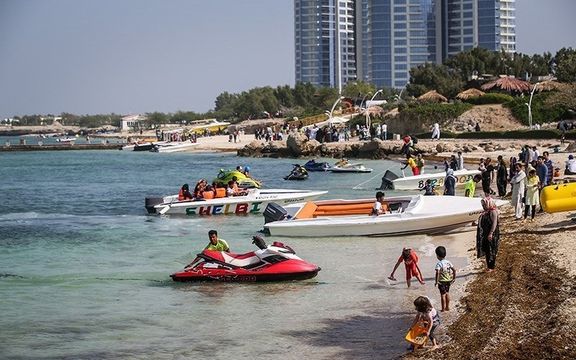
Iran’s embassy in London has accused The Times of London of 'Iranophobia' for mocking Tehran’s offer to host football fans during the World Cup in Qatar.
In a tweet Thursday, the embassy wrote that Iran and its islands in the Persian Gulf were “safe for all including Britons and World Cup fans from around the world to enjoy the beauties of this land,” and that “Iranian civilizational and historical identity cannot be distorted by Times.”
In an article Wednesday headlined "No Room in Qatar? Enjoy the World Cup From An Iranian Island," the Times scoffed at Iran’s readiness to host soccer fans and its considering waiving visa requirements for Kish and other islands.
"Alcohol is banned, British nationals are regularly picked up on spurious charges of spying and only two weeks ago female football fans were pepper-sprayed for having the cheek to attend an international match,” the Times wrote. In Qatar itself, strict laws banning alcohol consumption may be waived during the World Cup for foreigners in hotels if not in stadiums.
Despite an expectation of one million visitors in Doha for the tournament in November and December, booking for hotels has not yet begun. Fans from around the world are looking at options including rooms on a cruise ship at $4,000 a week, private accommodation, and luxury camping in the desert.
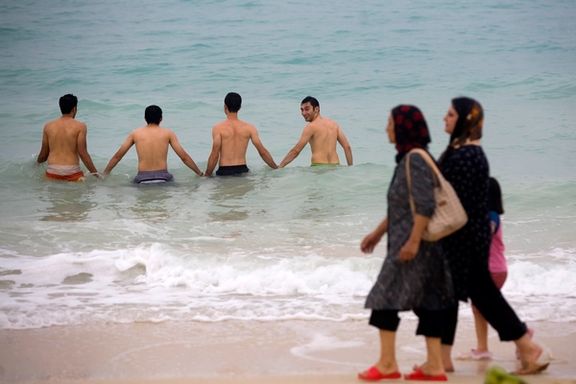
On Sunday, Rostam Ghasemi, Iran's transport minister, met with his Qatari counterpart, Jassim bin Saif Al Sulaiti, on Kish Island to discuss Iran’s involvement, following up suggestions made by President Ebrahim Raisi during a visit to Doha in February.
"Kish is the focal location for these arrangements, although other coastal and non-coastal provinces in Hormozgan and Bushehr close to the Persian Gulf can play a supporting role,” Ghasemi said.
Daily flights
Mohammad Mohammadi, head of Iran’s Civil Aviation Organisation, said the current 72 daily Iran-Qatar flights could be boosted to 100 during the World Cup.
Iran’s tourist sector, which includes religious and medical tourism, has struggled in recent years in the face of both United States sanctions and the Covid-19 pandemic. The sector is keen for a boost from the World Cup and is touting the value on offer in Iran given the rial’s decline on foreign exchange markets. Despite Iran’s ban on alcohol and gender-segregated beaches, it was attracting around 5 million tourists annually before US ‘maximum pressure’ sanctions.
The Times, arguing that easing visa requirement for British and American citizens would not remove a tense political climate between Iran and the west, highlighted cases of dual nationals being arrested in Iran, including the daughter of one protesting this week in London outside the Foreign Office. Tehran and London both denied any connection between Iran recently freeing two British-Iranian dual nationals it had held for years on espionage charges and Britain finally paying a four-decades-old debt of £400 million ($530 million). But the connection between the money and hostages was clear to all for a long time and the exchange happened last month simultaneously.
Some Americans may also remember that Kish Island is where Central Intelligence Agency contractor Robert Levinson disappeared 16 years ago. The Trump administration said Iranian intelligence Iranian was responsible for his capture and probable death.
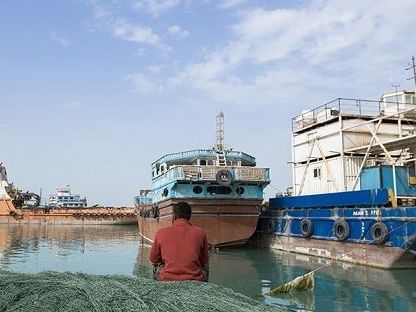
Iran's Revolutionary Guards say they seized two vessels in waters south of Iran, one carrying 250,000 liters of smuggled fuel and another loaded with 130,000 liters.
According to a report by ISNA, one of the vessels was seized in Persian Gulf waters near the Ameri Port in Bushehr province, and the other in Hormozgan province near the Jask Port on the Gulf of Oman on Friday.
Head of the Public Relations Department of the IRGC Navy Colonel Gholam-Hossein Hosseini said that the first ship's seven crew have been detained.
Last week the Guards had seized another vessel carrying 220,000 liters of smuggled fuel in the Persian Gulf and detained its crew of 11.
In recent weeks, IRGC naval units say they have managed to seize a total of 650,000 liters of smuggled fuel from the vessels they seized and handed them over to local judicial authorities.
The sizes of cargos involved indicate these were relatively small vessels transporting oil between local ports. Large tankers carry hundreds of thousands of barrels of oil.
Iran has boarded and seized foreign-flagged tankers in the past. One major incident occurred in January 2021 when the IRGC seized a Korean tanker for what seemed to be Iranian pressure on Seoul to release around $7 billion of funds frozen because of US sanctions.
The US Navy in the Persian Gulf region is known to have intervened in some instances to protect tankers.